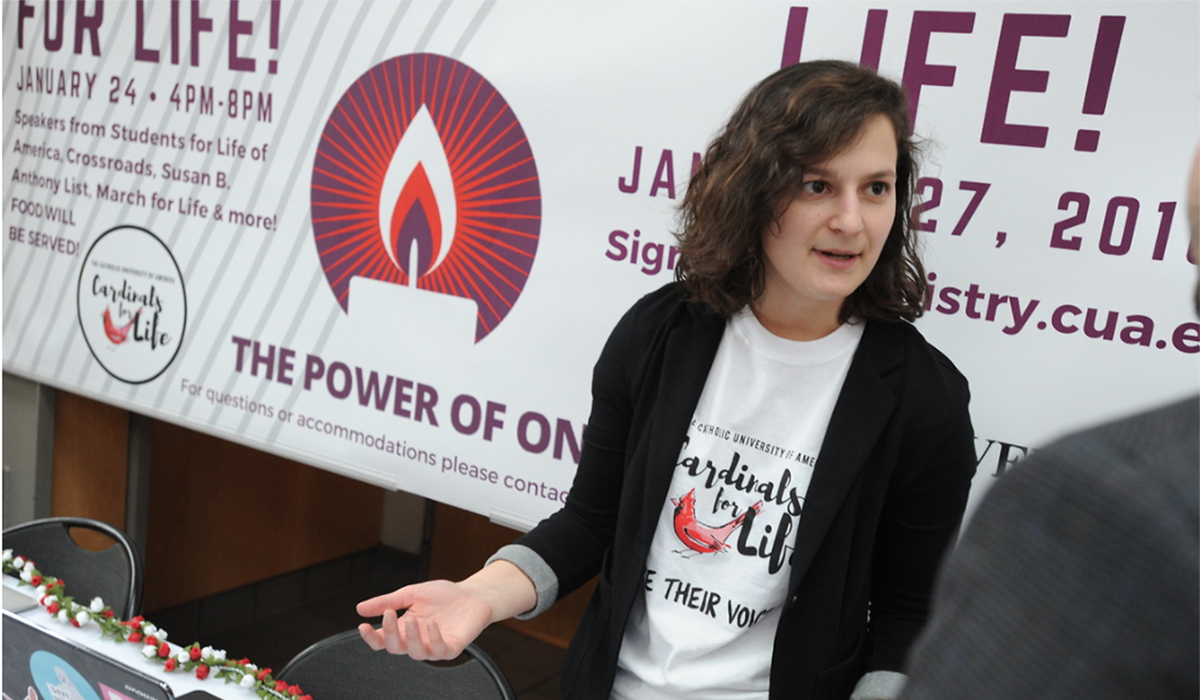
 Jan.26, 2017
Jan.26, 2017
Catholic University professors have joined the national conversation in the media this week on issues surrounding the pro-life movement, right to life, the Women’s March, and March for Life.
Law professor Lucia Silecchia published commentary in Crux on the legacy of Roe. V. Wade. “Roe’s legacy of devaluing unwanted human lives, misconstruing autonomy, and dulling the conscience with legalisms is one that has left four decades of lost lives in its wake,” she said.
In a Washington Examiner op-ed, Silecchia reflected on abortion legislation considered by the Supreme Court last year in light of Roe v. Wade: “Over four decades of abortion litigation and legislation have not returned to the profound question at the heart of the matter: the dignity of the young life at stake. Whole Women's Health evaded that issue even more than its precedents, by failing to even mention children themselves.”
Also in the Examiner, Angela Knobel, associate professor of philosophy, reflected on the Women’s March and March for Life, and the discussion on whether one can be both pro-woman and pro-life. “When feminists exclude feminists just because they dare to think differently about abortion, they send only one message: It's not okay to think about abortion, because it's not okay to think,” she said.
Law Professor Mary Leary published an op-ed in National Review reflecting on how misogyny that has been accepted in our culture is now being reflected politically. “As a legal scholar and an advocate against human trafficking, child exploitation, and domestic abuse, I must note that the raw, ugly truth of our culture’s depreciation of women is old news,” she says. “The minimizing of any campaign’s negative tone toward women, and the acceptance of candidates who are openly hostile to women’s dignity, simply should not come as a surprise. The government is supposed to represent American values. If we take a look at our culture, on this score this government actually does so very accurately.”
Chad Pecknold, associate professor of theology, admitted in Washington Examiner commentary that he was not always pro-life.
“I was intentionally confused about embryology,” he said. “I say intentionally because intellectually I knew that our genetic complexity, our DNA, is present in its entirety from the moment of conception. But I wanted to suppress this thought. To face it would be to confront why abortion was wrong. … My own ‘conversion’ to the right to life came with the terrible realization that I had been passive about the greatest social evil of our time.”
Lawrence Grayson, visiting scholar of philosophy, published op-eds on the culture of life in Our Sunday Visitor and National Catholic Register.
“Enacting laws to restrict abortion, as important as this is, is only a partial solution. Laws can be rescinded or amended. What is needed is a conversion of the hearts and minds of the American people, a spiritual renewal, the development of a public morality,” he said in Our Sunday Visitor. “This will not be easy or quick, but it is not unattainable. It can be won with God’s help enlisted through prayer, penance and the sacraments. Let us support the pro-life efforts of the nation’s new political leadership and pray for their success.”
Similarly, in the National Catholic Register he argued, “Electing a pro-life president was a success. But it is a dangerous assumption to consider this as the desired victory. We who are pro-life, pro-family and desire religious freedom must continue to pray and must support our political representatives in upholding their campaign promises."
Student Jeanne Marie Hathaway was quoted in an Atlantic story on President Trump’s policies and the pro-life movement. “To her, the most important thing is following a ‘consistent life ethic,’ which means caring about women just as much as unborn children,” the article stated.
A Catholic University web story profiles senior politics major Stephanie Schmitt, president of the University’s Cardinals for Life organization. Schmitt was also interviewed for a WJLA story on the march.
“There’s a common misconception that pro-lifers are all angry, conservative, and that we don’t understand the modern world,” Schmitt said. “If people talked to us, they would realize this movement is all about love, gaining love and respect for the people who don’t have it.”
MEDIA: To arrange an interview with those quoted in this story, contact the Office of Marketing and Communication at communications@cua.edu or 202-319-5600.
Need an expert? The University Experts Guide features faculty from more than 100 disciplines.